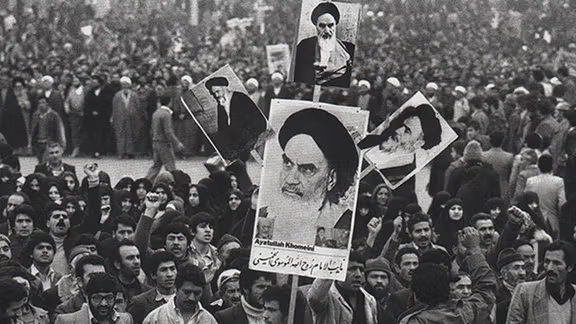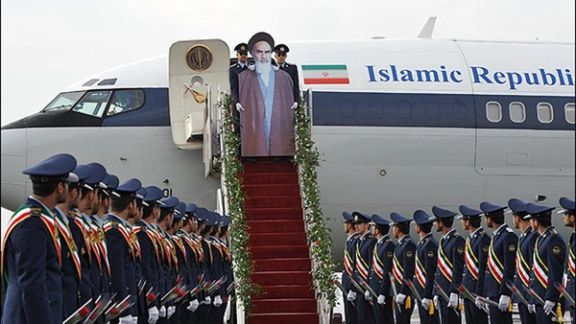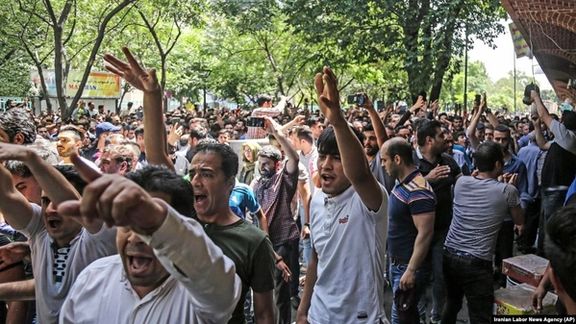The Referendum On the Islamic Republic Has Expired

Forty-five years ago, on March 30, 1979, Ayatollah Ruhollah Khomeini led a referendum with a single question: “Do you want an Islamic Republic?”.

Forty-five years ago, on March 30, 1979, Ayatollah Ruhollah Khomeini led a referendum with a single question: “Do you want an Islamic Republic?”.
During the referendum days, I was a 19-year-old youth serving as a poll worker at a rural polling station near Shiraz. The Islamic Republic’s regime has been the subject of my constant study from that point onwards.
On March 30th and 31st, 1979, villagers showed up at the polls enthusiastically wishing the new regime would pay attention to their demands and problems. Most of them had believed the promises of the new leaders with unwavering simplicity. In that village, the voting result fell approximately 5% below the final national tally – with a dozen blank ballots and votes cast for Iranian singing divas Googoosh and Hayedeh. Invalid votes were an occurrence that started from the very first election conducted under the Islamic Republic’s regime.
Today, the young generation that has experienced the Islamist regime’s policies first-hand have five questions in regards to the 1979 referendum. And, they have the right to question the 1979 generation’s actions – and they deserve answers based on facts on the ground, documents, and memoires.

Here are some of the new generation’s questions:
1. Are the results of that referendum reliable?
The reported 97% "yes" vote from 99% of Iranian voters in the referendum couldn't be verified, because independent and international observers were not invited to monitor it and there was no transparency.
It is a fact that a significant number of people participated in that referendum; however, giving a firm opinion about the percentage is impossible, much like in all types of elections in the Islamic Republic.
It is also a fact that Khomeini deceived the Iranian people about the future of their country by posing the question of whether they wanted an Islamic Republic (“yes” or “no”) with maximum ambiguity. This is because he simultaneously advocated for the totalitarian system of the Guardian Jurist (Supreme Leader) in his lectures in Najaf, while confirming his support for the French Republic during his stay in Neauphle-le-Château.
In this referendum, people voted based on their understanding of the terms "Islamic Republic" without knowledge of Khomeini's lectures, or how his aides, Ebrahim Yazdi and Sadegh Ghotbzadeh engineered Khomeini's words and conveyed them to the Western media. One notable and infamous moment happened when a reporter on the plane carrying Khomeini from Paris to Tehran, asked the cleric how he felt on the day of his return to Iran, and Khomeini replied "heech" in Persian, meaning "nothing".
Sadegh Ghotbzadeh used the phrase "no comment" instead of the English equivalent "nothing," which has an entirely different meaning.
2. Why did Khomeini hold a referendum less than two months after the revolution, and during Norouz?
Khomeini was familiar with the psychology of the Iranian masses. He knew he had to strike while the iron was hot.
During Norouz vacation, which began two weeks prior to the referendum, all newspapers in the country were closed.
He also knew that he could sell the new regime, born out of terrorism and bombing and lacking any governance experience, to the general public, only by relying solely on emotions and ignorance.

The people who considered themselves victorious in overthrowing the royal system were proud of this achievement. They lived in the empty dreams spun by revolutionaries, such as the promise of free water, electricity, and public buses, alongside ideals of spirituality and justice; they could have woken up after one or two years and Khomeini's picture would have no longer been visible on the moon – as was claimed by many in the early days of the revolution.
For this reason, it was necessary to drag the masses to the voting booths with stereotyped questions – and without wasting any time.
3. How did the different political groups react to this referendum?
Most political groups participated in the referendum and voted “yes”.
The Islamist groups fully participated in the referendum without any conditions and voted “yes”. Nationalist forces also participated and voted positively.
The vote of Mojahedin-e-Khalq (MEK) was positive but conditional. The Tudeh Party of Iran and other older communists voted “yes”, but the People's Fada’iyan and the Kurdistan Democratic Party boycotted the referendum.
Political groups enjoyed freedom of speech and press in the early months of the regime, before it had fully consolidated its power.
4. Was there any talk about the form of the new regime in the public sphere in the days preceding the referendum?
If you examine the press, news programs, and conversations in Iran before the referendum, you'll find no mention of guardianship of the jurist, Islamization, elimination of dissent, or compulsory hijab by the members of the Revolutionary Council, most of whom were clerics.
All of these discussions began during the drafting of the new constitution and the meetings of the Assembly of Experts to revise the draft.
The Iranian people were completely in the dark about what would happen to the governance system from February 11, 1979, to March 31, 1979.
5. Are the results of that referendum valid today?
In a system where only three referendums have been held in 45 years—namely, one referendum for creating the system and two referendums for the vote on the constitution (with a 99% positive vote and 85% participation in 1979) and its revision (with a 99% positive vote and 54% participation in 1989)—one cannot rely solely on the referendum for the legitimacy of a political system.
No referendum has been held for 35 years. Today, only less than ten percent of the country's population is over 63 years old, who were over 18 years old in 1979 and could vote then.
Today, the result of the referendum on the Islamic Republic has simply expired – even if it was reliable.